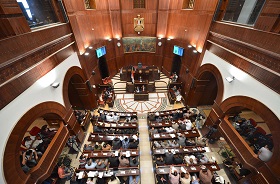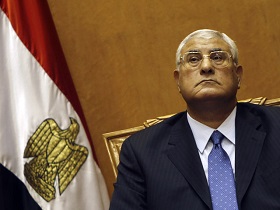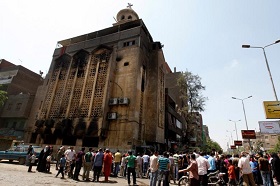Morsi’s Downfall
In
Login if you are already registered
(no votes) |
(0 votes) |
PhD in Law, Associate Transparency International-R lawyer, Assistant Professor of the Moscow State Law Academy
This paper analyses the political, economic and legal reasons for the ouster of Egypt’s President Mohammed Morsi. It looks at the ideology of political Islam in the country and proposes dividing political Islam into three groups: moderate, radical, and ultra-radical. It also puts forward measures to mitigate further destabilization by engaging all political actors in a political dialogue.
This paper analyses the political, economic and legal reasons for the ouster of Egypt’s President Mohammed Morsi. It looks at the ideology of political Islam in the country and proposes dividing political Islam into three groups: moderate, radical, and ultra-radical. It also puts forward measures to mitigate further destabilization by engaging all political actors in a political dialogue.
The year-long rule of Mohammed Morsi, legitimately elected president of Egypt with a largely Islamist support base, ended in a military coup on July 3, 2013. With opposition forces’ approval, the army, (the most powerful and influential, particularly from the economical point of view, mechanism of government in Egypt throughout the post-war period) wrenched control from the government, removing Morsi and his government from power. The duties of the head of government were vested temporarily in the head of the Supreme Constitutional Court, Adly Mansour, who had been appointed to this office once before by Morsi himself on July 1. They have also suspended the constitution and taken Morsi into custody.
On July 9, 2013, Mansour appointed liberal economist Hazem Abdel Aziz Al Beblawi as prime minister. Al Beblawi had formerly served as the finance minister and negotiated a USD 5 bln loan from the IMF. Mohamed Elbaradei, the Nobel Peace Prize winner and former IAEA head who now leads the liberal Ad-Dustur party, was made Vice-President as Salafis are said to have opposed having Elbaradei as the prime minister and head of the executive branch. The ultra-orthodox Salafi Nour party had supported the army in toppling the president, as they believed that Morsi was not sufficiently pro-Islamic.
On the night of July 9, 2013, Mansour promulgated his Constitutional Declaration promising to deliver a new constitution within four and a half months for adoption by the people through a referendum. The presidential election will be held within two months of the adoption of the new constitution. Hence, the incumbent president is to remain in office till March 2014.
Morsi was overthrown because of a number of serious blunders that he made in the economic, political and legal spheres.
The first cause of the coup was Morsi’s conflict with the military. Historically, the Egyptian army has long been argued to be the chief pillar and support for government. Since the monarchy was abolished in 1952, the military has always been at the head of the government. Morsi became the first leader that has never donned a military uniform. The army did not like him from the outset and in fact supported his opponent, Ahmed Shafik [1] . Morsi made several mistakes dealing with the army. One of the first things he did as president was to dismiss the leaders of the Supreme Council of the Armed Forces headed by Field Marshal Mohamed Hussein Tantawi, who practically ran the country between February 2011 and June 2012. To undermine the army’s authority, in August 2012, Morsi tried to start a war with Israel over Sinai, using the killing of 16 Egyptian border guards by terrorists at the Karm abu Salem crossing near Rafah at the Egyptian-Israeli border as a pretext. However, Israel did not move its troops to the Sinai Peninsula, and the two countries managed to avoid direct military confrontation. Finally, General Ahmed Shafik was forced to emigrate.
Another political blunder by Morsi was the serious conflict he had with the judiciary following the Constitutional Declaration he promulgated on November 21, 2012 effectively banning any and all appeals against presidential decrees in court.
A third political failure that triggered the protests which led to Morsi’s downfall was appointing Adel Asaad al-Khayyat, one of the political leaders of the radical Islamist Jamaat-e-Islami movement, as Governor of Luxor [2]. In 1997, his party’s commandos launched a terror attack on a group of Western tourists visiting the temple of Hatshepsut in Luxor, killing 62. Al-Khayyat is believed to have been directly involved in the planning of this terrorist act. Following numerous and vocal protests, al-Khayyat resigned on June 23, 2013. Then, both the public and the government realized, first, that after the 2011 revolution citizens were entitled to demand that decisions made by the authorities be revoked, and to insist on changes to the policies – something unthinkable in the times of Hosni Mubarak, Gamal Abdel Nasser or Anwar Sadat. Second, short-sighted decisions taken by the president spelled the beginning of the end of Morsi and his Muslim Brotherhood’s time in office.
These events were unfolding against a background of a deteriorating domestic economy. To qualify for IMF aid, Egyptian authorities had to resort to an unpopular measure and cancelled subsidies for regular unleaded petrol; as a result, petrol prices have tripled since March 2013. According to political scientist Alexander Ivanenko, “starting April 1, 2013, the authorities introduced rationing for petrol with 80, 90, and 92 octane ratings. However, subsidized petrol is only available for economy cars, and everybody else has to pay market prices. The current developments in Egypt prove the Muslim Brotherhood’s incompetence in the social and economic spheres, and the failure of the ‘Islam is the solution’ slogan”.
The Muslim Brotherhood, which effectively ruled the country through the Freedom and Justice Party, and Morsi personally were resented by many – from liberals who always claimed that they had been “robbed of their revolution,” those in the poor communities of Sadr City who could not feed their families because of inflation and food shortages to Salafis who lost faith in Morsi’s pro-Islamist policies and even the army and judges sporting fresh memories of the humiliations they had been subjected to by the president. This combined in leading to his ouster.
Religious Organizations in Egypt, Their Resources
With the new law on political parties of March 2011, which set the party foundation threshold at just 1,000 signatures, the number of parties increased many-fold. When Morsi came to power, Islam became a political platform, and the majority in the lower and upper chambers of parliament hailed from Islamist factions of various stripes.
Importantly, Morsi continues to retain the loyalty of numerous supporters. He won 51.7 per cent of the votes in the second round of the presidential election in June 2012, against 48.3 per cent in favor of Ahmed Shafik. It is no exaggeration to say that the nation currently is split in two. Morsi is supported by members of the Muslim Brotherhood, some Salafis and followers of the ultra-Islamist terrorist factions at Jamaat e-Islami and also by some who supported the revolution that ousted Mubarak in 2011. The proponents of the liberal and secular government in Egypt include Elbaradei, Al Beblawi and some of the army commanders. To undermine Morsi’s support, the transitional government and the army focused on persecuting Muslim Brotherhood members [3]. They have also closed down all public media loyal to the Morsi regime (previously similarly loyal to Mubarak’s regime throughout his 30-year rule) [4]. While the Muslim Brotherhood may be undermined, it is not defeated.
Before Morsi was deposed, the Muslim Brotherhood’s Freedom and Justice Party called on leaders of forty Islamist parties to join the National Coalition for Supporting Legitimacy, and urged them to denounce political violence and "break ties with the corrupt figures" from the Mubarak regime. The coalition was joined by the Salafist parties Al-Watan (“Fatherland”), founded in January 2013 by "Nour’s former leader Emad Abdel Ghafour; "Al-Shaab (“People’s Party”); the New Workers’ Party; "Al-Fadila (“Dignity”); and the young Salafis’ faction called Islah (“Egyptian Reformist Party”). The coalition also had representation from the Building and Development Party, which was created by the terrorist group Jamaat e-Islami, and more moderate Islamists from al-Wasat (“Center”).
This alliance of Mohamed Morsi’s opponents, which did not last a day, is rather typical, and had an earlier predecessor in the alliance of pro-Islamist parties called Democratic Alliance for Egypt which was set up in June 2011 in response to the creation of the "Democratic Alliance for the Egyptian Coalition that supported Mohammed Morsi during the presidential election. Same parties could be seen simultaneously joining pro- and anti-Morsi coalitions.
Islamist parties on the Egyptian political scene can be described as belonging to three groups: moderate, radical and ultra-radical.
Moderate
Those include the Muslim Brotherhood movement acting as the Freedom and Justice Party; the latter keeps trying to negotiate with the army. This movement is also represented by the Al-Wasat Party.
Radical
The radicals belong to the Salafi movement [5] , which in today’s Egyptian political landscape includes numerous parties [6] many of which were formed as splinter groups from larger existing parties. For instance, the leader of the Al-Fadila Party (“Dignity”), Adel Abdel Maksoud protests against the party’s more moderate principles, left it in 2011 and together with supporters founded a new party – "El-Asala. This movement is therefore far from consolidated. In fact, it is exemplary in its political disunity. This can also be seen in the Salafi parties’ failure to agree on their position toward Morsi. However, it is this variability that may bring this movement to power: it would be enough for one of these parties to win the majority of votes, and the Salafis could join their forces and come out in a united front.
Ultra-radical
Ultra-radical Islamist movements in Egypt do not so much strive for power as pursue war of terror on the Israelis and the infidels. These movements are, first and foremost, jihadists who have failed to get their own Islamist party registered (it used to be called the Security and Development Party), and those members of the Jamaat e-Islami movement that are represented by the Building and Development Party (which was registered in 2011).
Other religious political forces
The Morsi Constitution, adopted at the end of December 2012 and currently suspended, has played a negative role in inter-faith and sectarian relations. Although the Constitution offered safeguards to Christians and Jews (Article 5), in reality, "Christian Copts, who are an ethnic minority in Egypt, and Sufis were left without any government protection, leading to increased attacks on them by Islamists. Representatives of the Nubians tried but failed to register their own Party of the Nubians of the Nile. The Rifa'i order, which is the most numerous Sufi order (tariqa) with over three million followers launched a party called the “Voice of Freedom,” but it lost in parliamentary elections. Ibrahim Zahran, a representative of another Sufi order, "Azamiyya (1.5 million followers), founded the "Party of Egyptian Liberation, a secular party including Muslims, Armenians, Copts, Nubians and Sufis. This party stands in opposition to Salafis who call Sufis heretics and destroy their shrines.
An Ideal President for Egypt Today
After the removal of Morsi, power went to liberal-minded secular circles that deposed the Hosni Mubarak regime in 2011 and have now wrestled back the achievements of the revolution. In the new interim government, which was sworn in on July 15, General Abdel Fattah el-Sisi, as expected, not only retained his post of Minister of Defense and Defense Industry of Egypt, but was also appointed first deputy prime minister. Of 33 ministerial offices in the new government, three are held by Copts, and the Ministry of Trade and Industry is now led by the liberal Christian politician Mounir Fakhry Abdel Nour. The cabinet also includes three women: Minister of Health and Population Maha Zein el-Aabdeen; Minister of Environmental Affairs Laylah Rashid Exander; and Culture Minister "Doriah Sharaf el-Din, in a symbolic benevolent step to restore equality and remove all discriminatory barriers envisaged by the Morsi constitution.
The new government will have to offer equal treatment to all faiths and sects, and this dialogue should keep all religious movements at an equal distance. This objective is compounded by the fact that the Muslim Brotherhood, which continues to enjoy widespread vociferous support and has refused to participate in the interim government, insists on reinstating Morsi as president.
The question is what position will they choose? Will it be a peaceful opposition or a violent resistance? Islamist movements in Arab countries are more than just political parties. They provide social support, act as paramilitary security forces, and provide education [7], almost like Mafia clans in Sicily once did. The paradox here is that the further away they are from parliament, the stronger the support they enjoy among the poor. However, the lack of access to mechanisms of government renders them illegitimate and disengaged from real decision-making on allocating the resources needed to achieve their ultimate goal of creating an Islamic state.
In contrast, Salafis, who were quick to distance themselves from President Morsi, lent their support to the army and the transition government after his deposition, winning legitimacy in the eyes of the caretaker government while staying true to the street protests.
Ideally, Egypt could benefit from a national unity government representing different streams of Egyptian politics and different faith groups. However, to revive the economy and the country’s investment attractiveness, the head of the Cabinet or even the President should come from secular circles and be a figure well known abroad, like Elbaradei or the current prime minister, Hazem Al Beblawi. In these conditions, the army will assume functions similar to those that the army in Turkey had before Prime Minister Recep Tayyip Erdoğan came to power in 2003: securing the secular foundations of the state. However, this mission in Egypt is bound to encounter severe resistance since political Islam there has deeper roots and is better established.
Conclusions
It may be difficult to predict with confidence what happens to Egypt, but one thing is certain: Morsi’s brief rule is over. The widely-supported Muslim Brotherhood movement now faces a choice: wither to try to become engaged in the new political process proposed by the caretaker government or embark on violent resistance and move underground – as it did under Hosni Mubarak. The former scenario is better for everybody as it allows the army and the government to control the movement and make sure that the Muslim Brotherhood does not leave the fold of moderate Islamists to join radical or ultra-radical Islam (jihadists and the Jamaat e-Islami).
In contrast, Salafis, who shrewdly distanced themselves from the President Morsi and after his deposition backed the army, at present may count (in the very least) on playing some part in a broad coalition in the new parliament. They will then be in a position to dictate their preferences to the government, as has already happened when Elbaradei’s premiership candidacy failed.
A national unity government would be an ideal approach to governing today’s Egypt. However, given present tensions and uncertainty over the Muslim Brotherhood’s future, there is little hope that this will emerge any time soon. Another route the authorities could take would be to revert to the kind of administration that existed under Gamal Abdel Nasser or Anwar Sadat, with a strong military power based on nationalist (rather than Islamist) ideology. Should the army be in a position to resist radicals, they may have the chance in future to establish a government on a more or less equitable basis (excluding ultra-radicals). Such a government is bound to be unstable, and the country may opt to follow the example of Turkey in the mid-1950s, when the army staged frequent coups for the sake of retaining a secular state (of the Kemalist type). There may be yet another unfavourable scenario if radical Islamists (Salafis) take over and start to create an Islamist state, disregarding either Europe or the US and suppressing internal opposition.
1. Former Prime Minister of Egypt (January to March 2011). He was also the civil aviation minister (2002-2012), and Egypt’s Air Force Commander (1996-2002). He ran in the 2012 presidential campaign, but lost to Mohammed Morsi.
2. The party is believed to have been founded by the Indo-Pakistani theologian and journalist Abul Ala Maududi (1903-1979). He believed that man, as representative of Allah on earth and the key focus of the Quran, must follow the law of the Lord. The world, according to him, is divided into the “Party of Allah” (“Hizb Allah”) and the “Party of Satan”, and should become the world of Islam. For details, see Z.I. Levin, Reform in Islam: To be or Not to Be? Moscow: 2005, p.181 (in Russian).
3. Morsi, together with Muslim Brotherhood leaders Muhammad Badie, Mahdy Akef and others are being investigated for "allegedly breaking out of prisons on January 25.
4. Egyptian prosecutors have demanded the "arrest of the resident head of Al-Jazeera channel on allegation of incitement to violence.
5. For the principles pursued by the movement and its links with Wahhabis see Muhammad Hisham Kabanni, see: "The “Salafi” Unveiled. USA. 1998.
6. Note: all religious political forces were banned under the 1971 Constitution.
7. See: Nathan J. Brown. When Victory Is Not An Option. Cornell University, 2012. P.9.
(no votes) |
(0 votes) |







